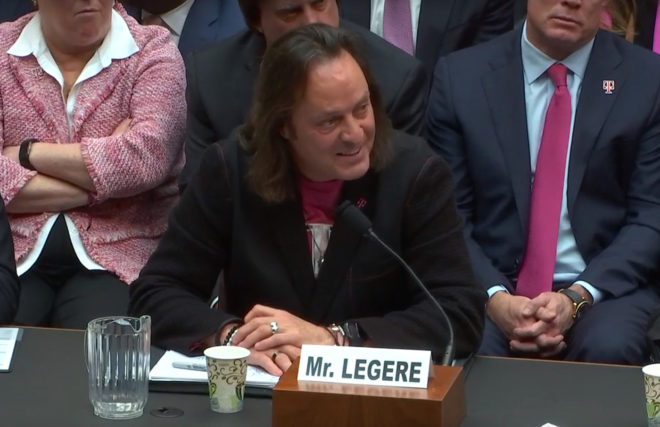T-Mobile-Sprint merger scrutinized during House hearing

Today T-Mobile CEO John Legere and Sprint Executive Chairman Marcelo Claure testified in front of the Subcommittee on Communications and Technology, but they weren’t the only ones testifying.
The panel also included Chris Shelton, President of the Communications Workers of America, who opposed the merger and said that it would lead to higher prices for consumers and 30,000 fewer jobs. He called out T-Mobile’s acquisition of iWireless, saying that T-Mo closed all iWireless call centers and more than 90 pecent of its retail locations. “Trusting Sprint and T-Mobile with American jobs is like trusting a vampire at a blood bank,” Shelton said.
The panel also included Carri Bennet, General Counsel for the Rural Wireless Assocation. Bennet came out in opposition of the T-Mobile-Sprint merger as well, voicing concerns that the merger could negatively effect rural operators who strike roaming deals with Sprint, who offers roaming rates that are “20 times less than T-Mobile’s”. If higher rates are adopted, Bennet claims, rural operators could be forced out of business and rural consumers could lose coverage.
Next in the panel was Doug Brake, Director of Broadband and Spectrum Policy for the Information Technology and Innovation Foundation, who spoke in support of the deal. Brake criticized merger opponents who say that having four carriers are better than three, suggesting that the U.S. wireless market could be more competitive with a combined T-Mobile and Sprint even if it means there are fewer overall carriers.
“A market of three relatively equal-sized companies in terms of subscribers that continue to invest and expand service, capacity, and offerings is a far, far better future than a lopsided market that competes only on price,” Brake said, adding that critics of the deal “under-appreciate the specific spectrum synergies teed up for a 5G deployment”.
Finally, Phillip Berenbroick, Senior Policy Counsel for Public Knowledge, spoke in opposition to the merger. He pointed to the failed AT&T-T-Mobile merger as evidence for why the T-Mobile-Sprint deal should be blocked, saying that it’s similar to the AT&T-T-Mo deal that was blocked by the DoJ which said that that deal would likely lead to higher prices, less innovation, and poorer quality services due to reduced incentives to invest in them. He also said that AT&T and T-Mobile claimed that they couldn’t roll out nationwide 4G LTE networks unless they were allowed to merge, but that both carriers ultimately did so without combining, and that T-Mobile and Sprint will ultimately be forced to build out their own 5G networks due to competition from Verizon and AT&T.
The panel was also grilled by several members of the subcommittee. “I appreciate both executives’ statements that they believe this merger will benefit consumers and result in lower prices, and their commitments to an accelerated deployment of 5G and the promises of expanded rural broadband, ” said Rep. Mike Doyle (D-PA. “However, I’ve seen a lot of mergers in this industry and others, and it’s hard to think of one where consolidation didn’t result in people losing their jobs, prices going up, and innovation being stifled.”
When Doyle asked Legere how this merger was different, he said that the T-Mobile-Sprint deal is a “unique merger” that will result in eight times the capacity for its network along with an 87 percent decline in the price per gigabyte of data and an increase in jobs.
Rep. Bill Flores (R-TX) asked what Legere thinks would happen if the merger isn’t approved, and the T-Mobile CEO said that the U.S. will fall behind in the race to 5G and T-Mo won’t be able to provide home broadband competition.
“I will not be able to, and the United States will not be able to enable its promise on building a world-leading 5G network. What we will create and Sprint will create along with AT&T and Verizon will be inferior to what’s being created in China and in South Korea. That will lead to loss of jobs and economic impact in the country,” Legere said. “I will not have the supply or the capacity to supercharge the Un-carrier. I’ll be able to move forward, but not in the same fashion creating competition. I will have limited if no ability to expand into the in-home broadband and provide Comcast and Charter the competition that they need.”
Claure said that if the merger isn’t approved, Sprint will have limited 5G coverage. The Sprint chairmen added that Sprint will have to borrow money to invest in 5G if the deal isn’t approved, which would lead to increased prices for consumers so that Sprint could pay that money back.
You can watch the full hearing for yourself in the YouTube video above. Legere and Claure are also scheduled to testify at a hearing with the Subcommittee on Antitrust, Commercial, and Administrative Law that was originally scheduled for tomorrow, but has been postponed.
This week, a group that includes several Democratic senators came out against the merger, claiming that it will lead to “dangerously high levels of market concentration” and that it will “likely cause Americans’ monthly bills to jump dramatically.” The T-Mobile-Sprint merger is still being reviewed by the FCC and DoJ. T-Mo and Sprint previously said that they expect the deal to close in the first half of 2019.
Based on everything that’s happened around the merger lately, what do you think its odds of approval are?
